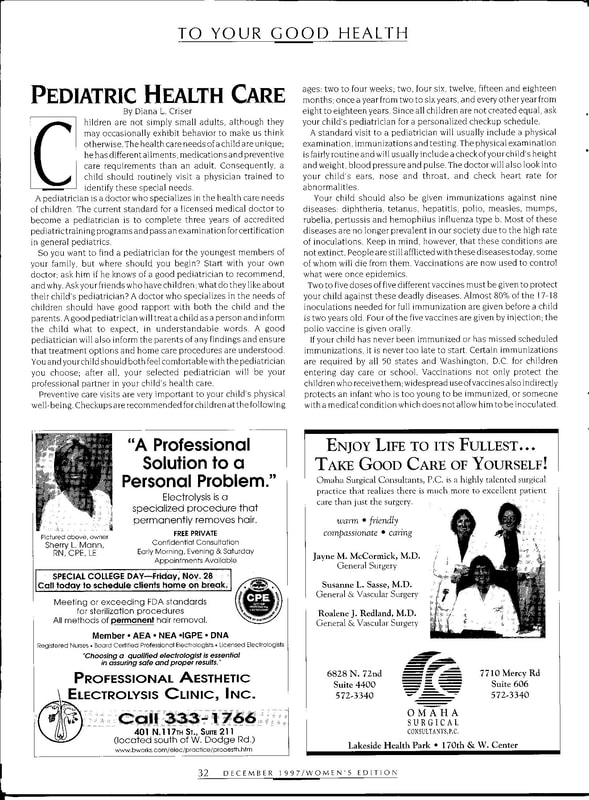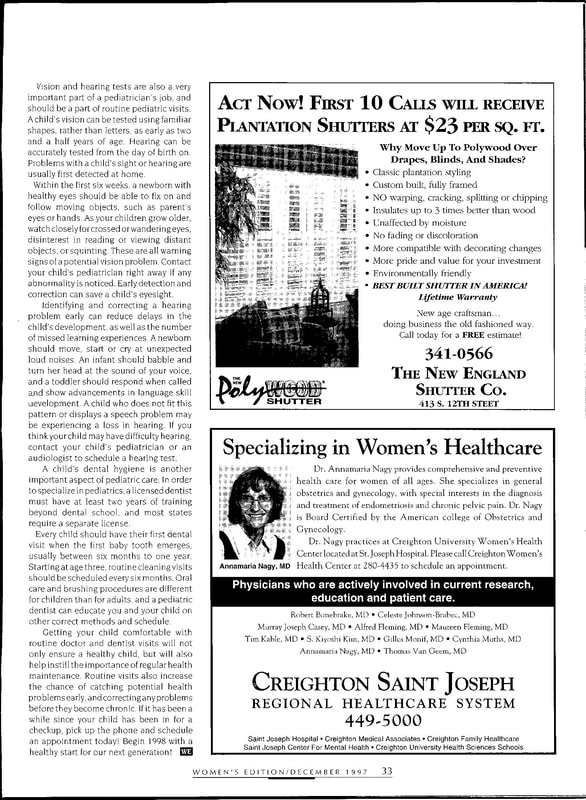To Your Good Health - December 1997PEDIATRIC HEALTH CAREBy Diana L. Criser |
| ||

hildren are not simply small adults, although they may occasionally exhibit behavior to make us think otherwise. The health care needs of a child are unique; he has different ailments, medications and preventive care requirements than an adult. Consequently, a child should routinely visit a physician trained to identify these special needs.
A pediatrician is a doctor who specializes in the health care needs of children. The current standard for a licensed medical doctor to become a pediatrician is to complete three years of accredited pediatric training programs and pass an examination for certification in general pediatrics.
So you want to find a pediatrician for the youngest members of your family, but where should you begin? Start with your own doctor; ask him if he knows of a good pediatrician to recommend and why. Ask your friends who have children; what do they like about their child's pediatrician? A doctor who specializes in the needs of children should have good rapport with both the child and the parents. A good pediatrician will treat a child as a person and inform the child what to expect, in understandable words. A good pediatrician will also inform the parents of any findings and ensure that treatment options and home care procedures are understood. You and your child should both feel comfortable with the pediatrician you choose; after all, your selected pediatrician will be your professional partner in your child's health care.
Preventative care visits are very important to your child's physical well-being. Checkups are recommended for children at the following ages: two to four weeks; two, four, six, twelve, fifteen and eighteen months; once a year from two to six years; and every other year from eight to eighteen years. Since all children are not created equal, ask your child's pediatrician for a personalized checkup schedule.
A standard visit to a pediatrician will usually include a physical examination, immunizations and testing. The physical examination is fairly routine and will usually include a check of your child's height and weight, blood pressure and pulse. The doctor will also look into your child's ears, nose and throat, and check the heart rate for abnormalities.
Your child should also be given immunizations against nine diseases: diptheria, tetanus, hepatitis, polio, measles, mumps, rubella, pertussis and hemophilus influenza type b. Most of these diseases are no longer prevalent in our society due to the high rate of inoculations. Keep in mind however, that these conditions are not extinct. People are still afflicted with these diseases today, some of whom will die from them. Vaccinations are now used to control what were once epidemics.
Two to five doses of five different vaccines must be given to protect your child against these deadly diseases. Almost 80% of the 17-18 inoculations needed for full immunization are given before a child is two years old. Four of the five vaccines are given by injection; the polio vaccine is given orally.
If your child has never been immunized or has missed scheduled immunizations, it is never too late to start. Certain immunizations are required by all 50 states and Washington, D. C. for children entering day care or school. Vaccinations do not only protect the children who receive them; widespread use of vaccines also indirectly protects an infant who is too young to be immunized, or someone with a medical condition which does not allow him to be inoculated.
Vision and hearing tests are also a very important part of a pediatrician's job, and should be a part of routine pediatric visits. A child's vision can be tested using familiar shapes rather than letters as early as two and a half years of age. Hearing can be accurately tested from the day of birth on. Problems with a child's sight or hearing are usually first detected at home.
Within the first six weeks, a newborn with healthy eyes should be able to fix on and follow moving objects, such as a parent's eyes or hands. As your children grow older, watch closely for crossed or wandering eyes, disinterest in reading or viewing distant objects, or squinting. These are all warning signs of a potential vision problem. Contact your child's pediatrician right away if any abnormality is noticed. Early detection and correction can save a child's eyesight.
Identifying and correcting a hearing problem early can reduce delays in the child's development, as well as the number of missed learning experiences. A newborn should move or start to cry at unexpected loud noises. An infant should babble and turn her head at the sound of your voice, and a toddler should respond when called and show advancements in language skill development. A child who does not fit this pattern or displays a speech problem may be experiencing a loss in hearing. If you think your child may have difficulty hearing, contact your child's pediatrician or an audiologist to schedule a hearing test.
A child's dental hygiene is another important aspect of pediatric care. in order to specialize in pediatrics, a licensed dentist must have at least two years of training beyond dental school, and most states require a separate license.
Every child should have their first dental visit when the first baby tooth emerges, usually between six months to one year. Starting at age three, routine cleaning visits should be scheduled every six months. Oral care and brushing procedures are different for children than for adults, and a pediatric dentist can educate you and your child on the correct methods and schedule.
Getting your child comfortable with routine doctor and dentist visits will not only ensure a healthy child, but will also help instill the importance of regular health maintenance. Routine visits also increase the chance of catching potential health problems early, and correcting any problems before they become chronic. If it has been a while since your child has been in for a checkup, pick up the phone and schedule an appointment today! Begin 1998 with a healthy start for our next generation!
A pediatrician is a doctor who specializes in the health care needs of children. The current standard for a licensed medical doctor to become a pediatrician is to complete three years of accredited pediatric training programs and pass an examination for certification in general pediatrics.
So you want to find a pediatrician for the youngest members of your family, but where should you begin? Start with your own doctor; ask him if he knows of a good pediatrician to recommend and why. Ask your friends who have children; what do they like about their child's pediatrician? A doctor who specializes in the needs of children should have good rapport with both the child and the parents. A good pediatrician will treat a child as a person and inform the child what to expect, in understandable words. A good pediatrician will also inform the parents of any findings and ensure that treatment options and home care procedures are understood. You and your child should both feel comfortable with the pediatrician you choose; after all, your selected pediatrician will be your professional partner in your child's health care.
Preventative care visits are very important to your child's physical well-being. Checkups are recommended for children at the following ages: two to four weeks; two, four, six, twelve, fifteen and eighteen months; once a year from two to six years; and every other year from eight to eighteen years. Since all children are not created equal, ask your child's pediatrician for a personalized checkup schedule.
A standard visit to a pediatrician will usually include a physical examination, immunizations and testing. The physical examination is fairly routine and will usually include a check of your child's height and weight, blood pressure and pulse. The doctor will also look into your child's ears, nose and throat, and check the heart rate for abnormalities.
Your child should also be given immunizations against nine diseases: diptheria, tetanus, hepatitis, polio, measles, mumps, rubella, pertussis and hemophilus influenza type b. Most of these diseases are no longer prevalent in our society due to the high rate of inoculations. Keep in mind however, that these conditions are not extinct. People are still afflicted with these diseases today, some of whom will die from them. Vaccinations are now used to control what were once epidemics.
Two to five doses of five different vaccines must be given to protect your child against these deadly diseases. Almost 80% of the 17-18 inoculations needed for full immunization are given before a child is two years old. Four of the five vaccines are given by injection; the polio vaccine is given orally.
If your child has never been immunized or has missed scheduled immunizations, it is never too late to start. Certain immunizations are required by all 50 states and Washington, D. C. for children entering day care or school. Vaccinations do not only protect the children who receive them; widespread use of vaccines also indirectly protects an infant who is too young to be immunized, or someone with a medical condition which does not allow him to be inoculated.
Vision and hearing tests are also a very important part of a pediatrician's job, and should be a part of routine pediatric visits. A child's vision can be tested using familiar shapes rather than letters as early as two and a half years of age. Hearing can be accurately tested from the day of birth on. Problems with a child's sight or hearing are usually first detected at home.
Within the first six weeks, a newborn with healthy eyes should be able to fix on and follow moving objects, such as a parent's eyes or hands. As your children grow older, watch closely for crossed or wandering eyes, disinterest in reading or viewing distant objects, or squinting. These are all warning signs of a potential vision problem. Contact your child's pediatrician right away if any abnormality is noticed. Early detection and correction can save a child's eyesight.
Identifying and correcting a hearing problem early can reduce delays in the child's development, as well as the number of missed learning experiences. A newborn should move or start to cry at unexpected loud noises. An infant should babble and turn her head at the sound of your voice, and a toddler should respond when called and show advancements in language skill development. A child who does not fit this pattern or displays a speech problem may be experiencing a loss in hearing. If you think your child may have difficulty hearing, contact your child's pediatrician or an audiologist to schedule a hearing test.
A child's dental hygiene is another important aspect of pediatric care. in order to specialize in pediatrics, a licensed dentist must have at least two years of training beyond dental school, and most states require a separate license.
Every child should have their first dental visit when the first baby tooth emerges, usually between six months to one year. Starting at age three, routine cleaning visits should be scheduled every six months. Oral care and brushing procedures are different for children than for adults, and a pediatric dentist can educate you and your child on the correct methods and schedule.
Getting your child comfortable with routine doctor and dentist visits will not only ensure a healthy child, but will also help instill the importance of regular health maintenance. Routine visits also increase the chance of catching potential health problems early, and correcting any problems before they become chronic. If it has been a while since your child has been in for a checkup, pick up the phone and schedule an appointment today! Begin 1998 with a healthy start for our next generation!


